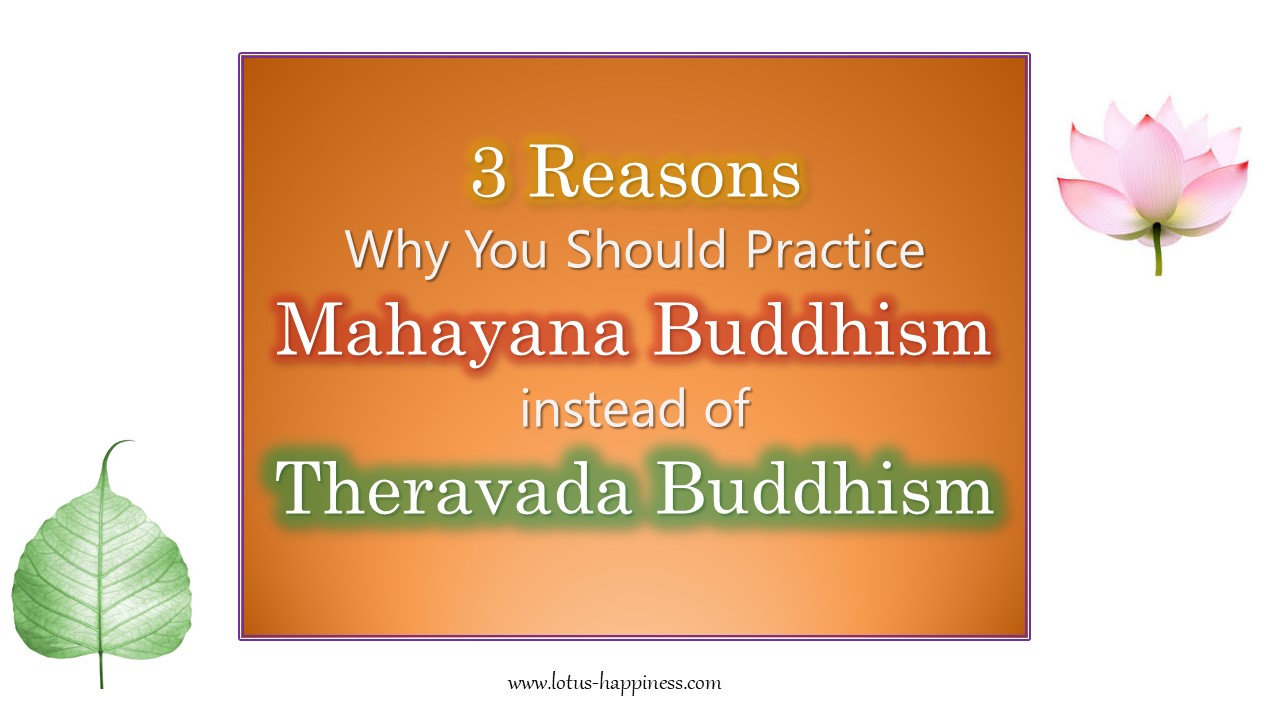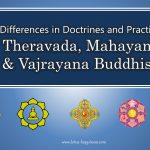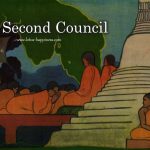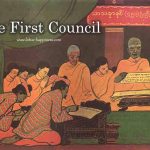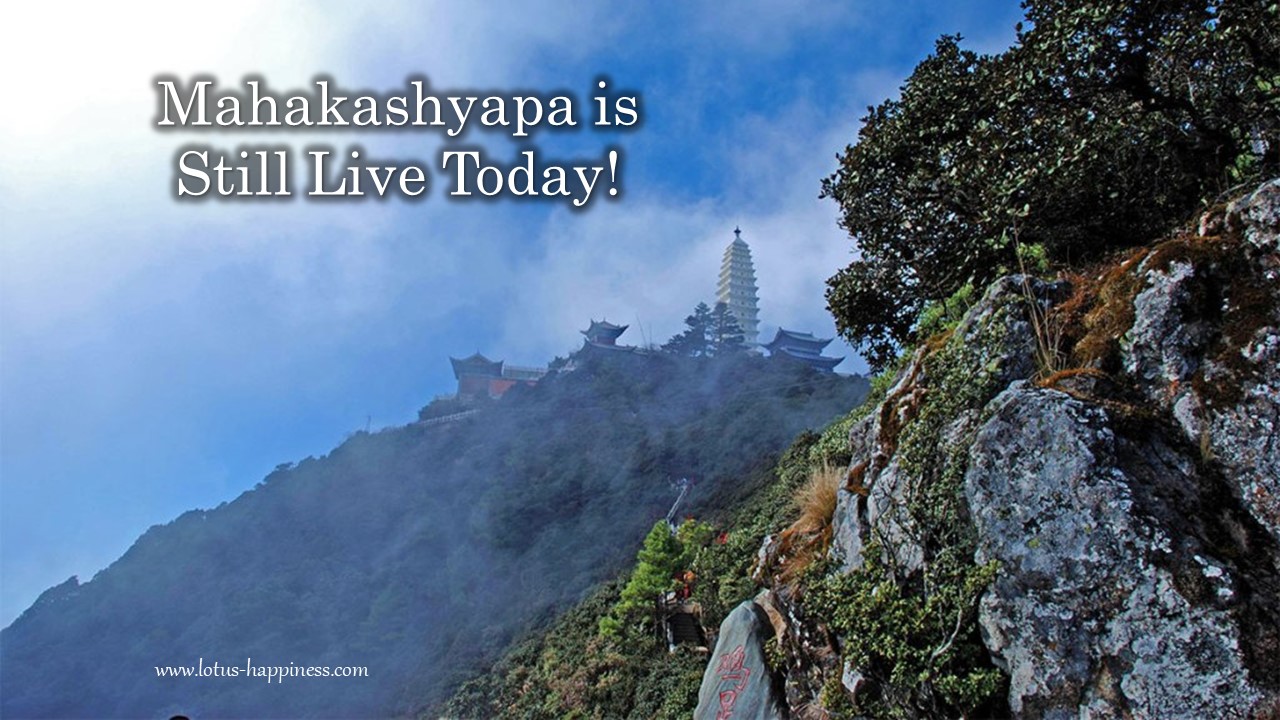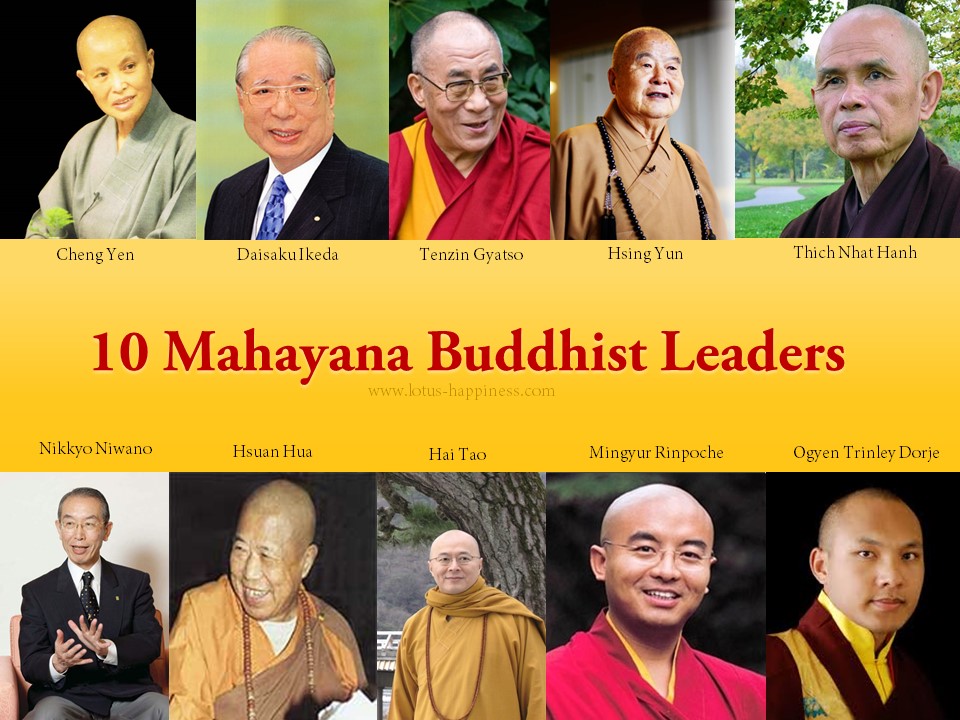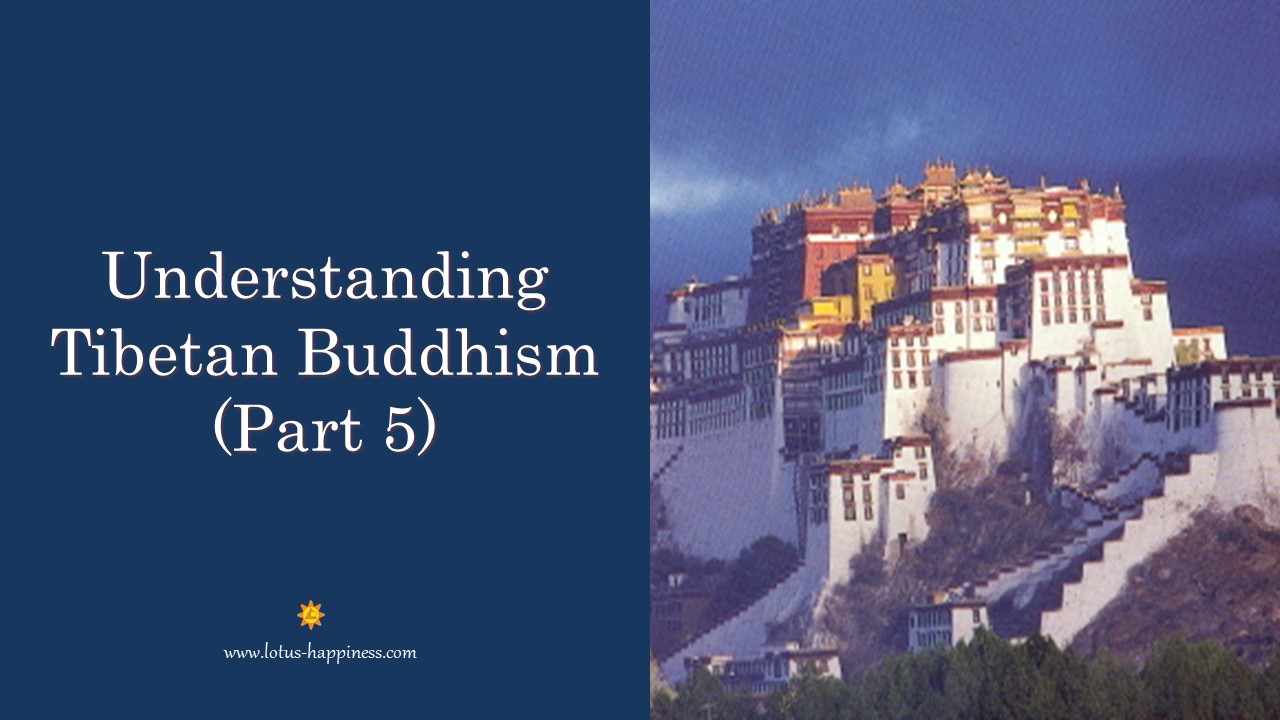3 Reasons Why You Should Practice Mahayana Buddhism instead of Theravada Buddhism
First, don’t get me wrong- my intention of writing this blog is not to denigrate Theravada Buddhism in anyway. In fact, I respect and appreciate the wonderful teachings in the Pali canon because there are tonnes of practical wisdom to be applied in daily life. I always believe that the diversity of different Buddhist sects, traditions, and lineages are causes for celebrations
The reasons why I choose to write this post is to educate people about the importance of practicing the Mahayana Buddhism, instead of the Theravada Buddhism, if and only if, you choose to practice Buddhism as a lay Buddhist.
In the course of my personal study of the various suttas and sutras, I could not help but notice some significant advantages and disadvantages between the practices of Mahayana and Theravada tradition. The downsides of practicing the Theravada Buddhism as a lay Buddhist cannot be simply brushed aside as irrelevant.
Let me explain the three key reasons why choosing to practice Mahayana Buddhism is more practical and beneficial for a lay Buddhist:
# – Avoid Rebirth in Three Lower Realms
One of the major disadvantages of practicing the Theravada tradition as a lay Buddhists is the fact that practices of morality, keeping the precepts, and performing Dana (giving) to the community of monks do not guarantee one not to be reborn in the three lower realms of Hell, Hungry Spirit and Beast. This means that all the good deeds we may have performed in our lives do not guarantee us to attain the minimum stage of Stream-Enterer (Sotapanna) that prevents the rebirth in the three lower realms.
The story of Queen Mallika is a testament to this fact. Although Queen Mallika was generally virtuous in her conducts – and in spite of her performance of various good deeds such as giving to the Buddha and the monks – she could not escape from being reborn in the hell for seven days just because of one silly evil deed she did in her life. You may refer to this blog post Law of Karma: The Story of Queen Mallika for more information.
Now, the problem is, most of us cannot guarantee our thoughts, words, and deeds to be 100% spotless and perfect in our entire lifetimes. There is a higher likelihood that we have accumulated more unwholesome deeds than good deeds. Even if we think we have done something good and beneficial for others, the results of these tiny good deeds may not supersede the heavy weight of innumerable unsavory deeds in our lives.
Just imagine: if one evil deed is equivalent to 7 days of rebirth in hell, how about 50,000 tiny little evil deeds arising from thoughts, words, and actions in our entire lifetime?
Let’s face it. The Law of Karma, the Law of Cause and Effect, is inexorably merciless. While it is fair and impartial, it works like a dispassionate computer system: if you do good, you will reborn in Heaven; if you do evil, you will reborn in Hell. Therefore, you really have to be incredibly mindful to watch your thoughts, words and deeds. And still, there is no guarantee you will attain the minumum stage of Sotapanna.
Practicing the Theravada Buddhism is only beneficial if one chooses to practice as a monk who actively teaches and propagates Buddhism as a Dharma teacher. Notable monks such as Ajaan Chah, Bhikkhu Bodhi, Ajaan Brahm will reap tremendous benefits from living, teaching, and propagating the Dharma wholeheartedly. It is highly probably that they have attained at least the stage of Sotapanna, or even higher, as a result of spreading the Dharma.
In contrast, innumerable evidences abound that by just reading the Mahayana sutras, one is assured not to be reborn in three lower realms. Here are some examples:
The Buddha declared to the monks: “In future lifetimes, if there are virtuous men and women who believe and revere without any doubts upon hearing the Devadatta chapter of the Lotus Sutra, these people will not fall into the paths of Hell, Hungry Spirit, or Beast. Instead, they will be reborn in the presence of Buddhas in the ten directions and they will always hear the Lotus Sutra at the place in which they are born. (Lotus Sutra 12: 2.7)
Then the Tathagata spoke again to Kashyapa: “O good man! You should now uphold all the words, chapters, clauses and all the virtues thereof of this [Mahayana Mahaparinirvana] sutra. Any good man or good man who hears the name of this sutra will never get born in to the four realms [of Hell, Hungry Ghost, Animal, and Asura.] Why not? I shall now expound to you all the virtues of this sutra and all that is practiced by innumerable boundless Buddhas.” (Mahayana Mahaparinirvana Sutra, Chapter 6: On the Virtue of the Name)
“When you recite the names of the Buddhas, offer burning incense, scatter flowers, conceive the aspiration of the Great Vehicle, hang banners and streamers, describe the sins of their eyes, and carry out repentance, you will be able to view Shakyamuni Buddha and the immeasurable emanated Buddhas in your present lifetime. Because of the power of the Great Vehicle, you will not descend into the evil paths for asamkhya kalpas. (Sutra of Meditation on Bodhisattva Universal Worthy 3.6)
#2 – Purifying the Unwholesome Karma
The teachings in the Pali Canon focus mostly on the “Preventive Methods” such as observing morality and keeping of precepts to prevent one from performing unwholesome karma arising from thoughts, speech, and actions. The results of practicing Theravada Buddhism are twofold: first, rebirth in Hell or Heaven; second, achieve any of the Four Stages of Enlightenment.
In contrast, the Mahayana teachings focus predominantly on the “Purification Methods” to cleanse the negative karma through the immeasurable merits of the Buddha accrued from reading the sutras and practicing samadhi of the Buddha, Dharma, and Sangha.
You must be wondering how does the actions of reading of sutras and reciting of mantras help in purifying one’s six senses? The simple acts of reading and chanting are themselves virtuous deeds. The constant mindfulness of the Buddha and Dharma through reading and chanting help us connect our ordinary minds to the enlightened minds of the Buddhas, which in turn, result in accumulation of vast merits in our lives. Moreover, Buddhas and bodhisattvas compassionately share their countless merits with us when we achieve spiritual oneness with the Buddha.
The Buddha’s merits we receive serve to purify all the unwholesome karma which enable us to transform suffering to happiness and good fortune in our lives. This is a form of spiritual healing in action. Some of the methods of purification are practices of repentance or meditating upon Emptiness. Here are the evidences:
“If there are virtuous men and women who accept and embrace the Lotus Sutra by reading, reciting, explaining, expounding, copying, or transcribing it, these people will receive eight hundred merits for the eyes, twelve hundred merits for the ears, eight hundred merits for the nose, twelve hundred merits for the tongue, eight hun-dred merits for the body, and twelve hundred merits for the mind. These merits serve to adorn, cleanse, and purify their six senses.” (Lotus Sutra 19: 1.1)
“O people of wisdom! Therefore, if there are shravakas who fail to observe the three precepts, five precepts, eight precepts, the precepts of a monk, the precepts of a nun, the precepts of a novice monk, the precepts of a novice nun, the precepts of a shikshamana, or various rules of dignified conduct out of ignorance, ill-will, or malice, if they wish to eradicate these sins and return to the ways of a monk who observes the rules of shramana, then they should diligently read and practice this authentic sutra, ponder the profound Law of Emptiness―the foremost in meaning―in order to connect their minds with the wisdom of emptiness. You should know that these people will completely eliminate all their sins and transgressions forever through every instant of their meditative thoughts. (Sutra of Meditation on Bodhisattva Universal Worthy 9.11)
“After the parinirvana of the Buddha, if there are any of the Buddha’s disciples who adhere to the Buddha-words by practicing this repentance, you should know that these people are carrying out the actions of Universal Worthy. Those who carry out the practices of Universal Worthy will not encounter any malicious manifestations or experience any evil retributions. If there are living beings who make obeisance to the Buddhas in the ten directions six times every day and night, recite the Great Vehicle sutra, and ponder upon the profound Law of Emptiness of the foremost in meaning and principle, then it only takes the time of a snap of a finger for them to eliminate the sins of birth and death accumulated over hundreds of millions of billions of asamkhya kalpas. (Sutra of Meditation on Bodhisattva Universal Worthy 9.4)
#3 – Attain Buddhahood
The objective of practicing Theravada Buddhism is to achieve Arhatship. For lay Buddhist, the goal is to attain the least minimum stage of Sotapanna. Whether one eventually attains this minimum stage is dependent, to a large extend, the inherent spiritual capacity of each individual. Nevertheless, one thing is for sure, just by doing good deeds itself is not sufficient for one to enter the stage of Stream-Enterer. We need a more powerful method as outlined in the Mahayana sutras.
The ultimate goal of the Buddha’s teaching is to achieve Supreme Perfect Enlightenment so as to completely eliminate sufferings arising from samsara. The practices of Mahayana Buddhism will enable one to attain Buddhahood. Here are the evidences:
“By way of prajna paramita, Buddhas of the past, present, and future attain Anuttara Samyak Sambodhi.” (Heart Sutra)
“Sariputra, if there are people who have already made the vow, who now make the vow, or who are about to make the vow, ‘I desire to be born in Amitabha’s Country’, these people whether born in the past, now being born, or to be born in the future, all will irreversibly attain to Anuttara Samyak Sambodhi. Therefore, Sariputra, all good men and good women, if they are among those who have faith, should make the vow, ‘I will be born in that country.’” (Amitabha Sutra)
“O Gainer of Great Authority! Who do you think this Bodhisattva Never Disrespectful was at that time? This person is none other than I myself [Shakyamuni Buddha]! In my previous lifetime, had I not accepted, embraced, read, recited, and expounded the Lotus Sutra for others, I would never have been able to attain Supreme Perfect Enlightenment so quickly. Because I was able to accept, embrace, read, recite, and expound the Lotus Sutra for others in the presence of the former Buddhas, I was able to quickly attain Supreme Perfect Enlightenment. (Lotus Sutra 20: 1.15)
The Buddha spoke to Ananda: “I, along with the bodhisattvas in the Wise Kalpa and the Buddhas in the ten directions, am able to wipe out the sins of birth and death accumulated over hundreds of millions of billions of asamkhya kalpas as a result of pondering the true meaning of the Great Vehicle. As a consequence of practicing the supremely wonderful method of repentance, each of us has been able to become Buddhas in the ten directions. If you wish to quickly attain Supreme Perfect Enlightenment or if you wish to meet Bodhisattva Universal Worthy and the Buddhas in the ten directions in your present lifetime, then you should read, recite, and ponder the meaning of the Great Vehicle in a secluded place. (Sutra of Meditation on Bodhisattva Universal Worthy 9.2)
Conclusion
If you choose to practice the Dharma as a lay Buddhist, and you wish to avoid rebirth in the three lower realms, purify your unwholesome karma to transform your sufferings into happiness, and attain Buddhahood quickly, then practicing Mahayana Buddhism is your most practical choice that will bring you the most optimum benefits.
Practicing Mahayana Buddhism doesn’t mean you need to stop practicing morality as documented in the Pali Canon. On the contrary, you can achieve a better balance through Mahayana practices because you can combine the best of both Theravada and Mahayana Buddhism to lead an empowering life.

